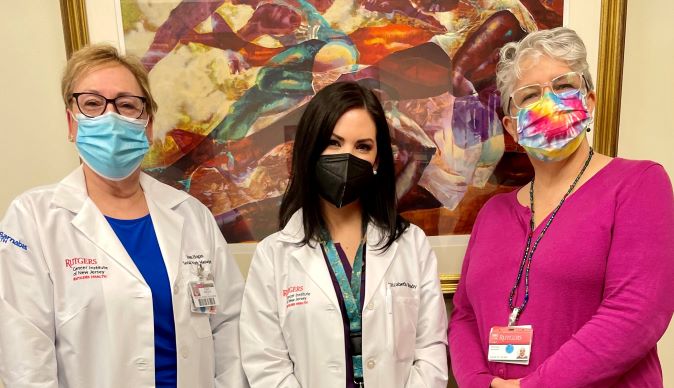New Brunswick, N.J., March 1, 2022 – Cancer is a challenging disease with many aspects. Psychosocial support services have powerful benefits on the success of a patient’s treatment and recovery. When Joan Hogan, MSW, LCSW, OSW-C, became manager of Social Work Services at Rutgers Cancer Institute of New Jersey last year, her vison was to expand supportive programming through a specialized team that works closely with patients, families and caregivers in navigating the cancer journey. She shares more about the team and these services, which have grown since her arrival.
What are some of the programs offered through social work services at Rutgers Cancer Institute?
Not only do oncology social workers help patients with practical needs, like providing support and finding resources in the institution and the community, but they provide educational programs and stress management initiatives. If you are a patient at Rutgers Cancer Institute, our social work team can introduce you to support groups on a variety of cancer-related topics such as living with breast cancer, bone marrow transplant support and support groups for newly diagnosed individuals, which are all free and open to patients and family members. We also introduce patients to progressive relaxation techniques, including mindfulness mediation to focus on mind-body connection and guided imagery, which helps individuals focus on mental images in order to evoke feelings of relaxation.

How are oncology social workers at Rutgers Cancer Institute uniquely positioned to help address the psychosocial care of cancer patients and their families?
Each of Rutgers Cancer Institute’s oncology social workers has a master’s level education in social work and is licensed by the state of New Jersey. Additionally, our social workers each have unique specialties and areas of interest including cultural diversity, LGBTQ equity, pediatric cancer survivorship, patient/family advocacy, anxiety, grief, PTSD, sickle cell disease, neurological cancers and more. Additionally, our social workers have either earned or are currently working towards receiving their Oncology Social Work Certificate (OSW-C). This certification is important for patients, their families and oncology staff because it reflects a knowledge base, skill set, and ethical standards specific to psychosocial oncology. You won't find these credentials at all cancer centers.
This year’s theme for Social Work Month which is in March is “The Time is Right for Social Work,” which underscores how the services social workers provide are needed more than ever as our nation addresses issues like systemic racism, the need for improved mental health care and COVID-19. What does this mean for you and your team?
Our team deals with various populations every day. We help them navigate the care that they need and see their challenges first hand. One of the things we all know because of the training we receive is that all of us are a lot more similar than we are different. Social work is uniquely placed to help us realize that we are all dealing with very similar sets of emotions and challenges. Cancer is an equal opportunity disease – so are some of the challenges that our nation is dealing with, such as systemic racism, bias towards others and fear of others. As social workers, we’re trained to meet every patient and every family member exactly where they are and set aside what we think we may know. If all of us can try to meet people where they are and set aside what we think we know, we can all make the world a better place.
Throughout the COVID-19 pandemic, oncology social workers continue to provide in-person, virtual and phone support to patients at Rutgers Cancer Institute, and collaborate with social work colleagues across the RWJBarnabas Health oncology service line.
For journalists – contact:
Krista Didzbalis
Media Relations Assistant
732-507-8307
krista.didzbalis@rutgers.edu
For patient appointments/inquiries – contact:
844-CANCERNJ (844-226-2376)

